How to Become A Ski Instructor: Qualifications And 5-Step Guide
by Frank V. Persall
Professional ski instructors lead fascinating and exciting lives as people who work in a seasonal career path.
If being up in the snow and mountains, working and skiing at a ski resort most of the day appeals to you, then becoming a ski instructor must be your dream job!
However, becoming a ski instructor definitely isn't easy and most definitely not for everyone.
If you are interested, figuring out how to become a ski instructor will help you decide it's the right path for you!
Contents
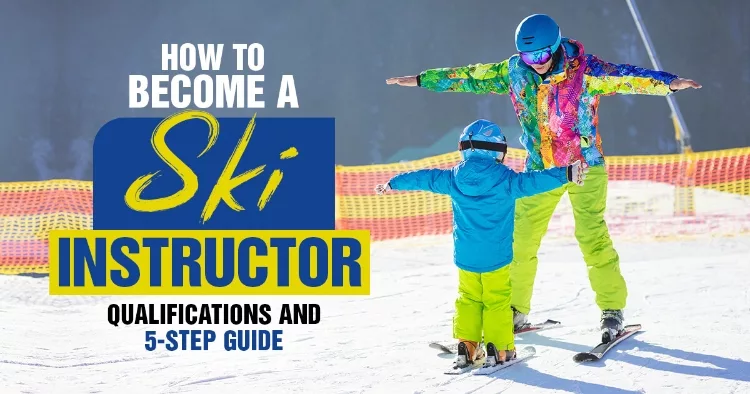
Do I Need To Be Highly Skilled To Be A Ski Or Snowboard Instructor?
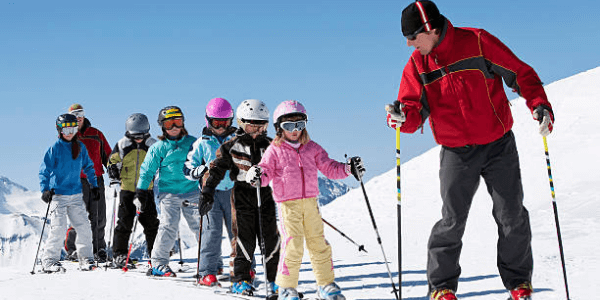
Learning how to become a ski instructor can be as daunting as it is exciting, but to put it simply the skills required to become a ski instructor aren't as high-level as you might think.
However, the better you are, the better you'll be at teaching— it would be good to aim for an advanced to expert level.
You can sum up the other requirements into 3 things:
- Dedication
- Time
- Budget
The expenses will accumulate while you're taking your ski instructor qualifications, so make sure you have enough savings to cover beyond the total cost of course fees.
And of course, you'll spend at least AN ENTIRE SEASON to get basic certification— it's going to be hard work that you'll need passion and perseverance to finish!
Becoming A Ski Instructor
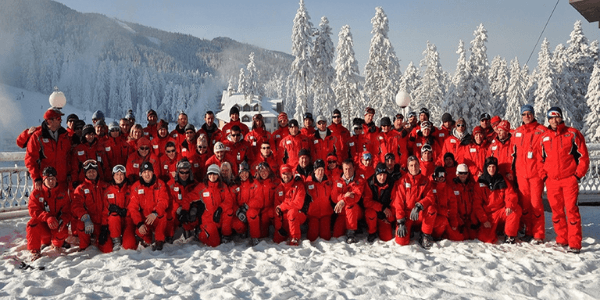
1. Do Your Research
First thing's first, research!
You should look up what courses are available in your own country, or wherever it is most accessible to you.
This isn't a job you can do anywhere in the world and if you don't live near any ski resorts, you'll probably have to move.
Which Ski Instructor Course Should I Take?
Different ski instructor courses or snowboard instructor courses will provide different qualifications that will also give you different future job opportunities.
Your qualification level will determine where you work and how big your pay will be.
The ski school you go to will provide certain privileges as well, but will also probably cost you more.
Also take note that the HIGHER the certification level you achieve, the EASIER it will be for you to find a job in a country of your choosing and to earn enough to keep teaching a career you can make a living out of.
Ski Instructor Qualifications
There are 4 levels of certification to become a ski instructor; the first two levels are achieved at your ski school.
Level 1 focuses on gaining the knowledge you need to become a ski instructor, while Level 2 will develop your skills in actually teaching others.
You can usually pass Level 2 after an entire season, after which it will take more time (even several years!) and ski instructing experience to pass Levels 3 & 4.
A Level 3 or 4 instructor qualification allows you to teach advanced skiers.
An instructor to both beginner and intermediate skiers will have a larger clientele base, so it would be ideal to aim for a higher qualification.
These certifications are given out mainly by four governing bodies worldwide, depending on which part of the world you live: BASI, CASI, PSIA-AASI, and NZSIA.
British Association of Snowsport Instructors (BASI)
Level 1 certification from a BASI ski school allows you to teach as a ski or snowboard instructor only in a non-mountain environment, such as dry slopes and indoors.
BASI Level 3 immediately qualifies you for the ISIA card. This is because the BASI system has an extended period of instructor training and teaching experience compared to others.
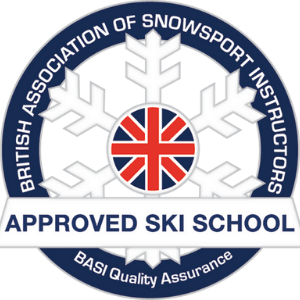
Canadian Ski Instructors Alliance (CASI),Professional Ski Instructors of America and American Association of Snowboard Instructors (PSIA-AASI)
If you attend a ski school with CASI or PSIA certification, you'll be able to be a ski or snowboard instructor anywhere in Canada or the US once you've achieved Level 1 qualifications.
CASI and PSIA-AASI Level 3 qualifies you for the ISIA stamp.
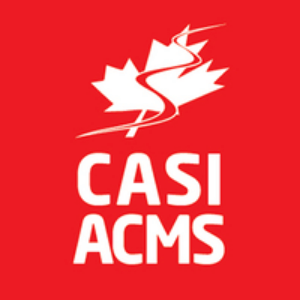
New Zealand Snowsports Instructors Association (NZSIA)
NZSIA Level 1 qualifications allow you to instruct in any ski resort in New Zealand or Australia, while NZSIA Level 3 qualifies you for the ISIA stamp.
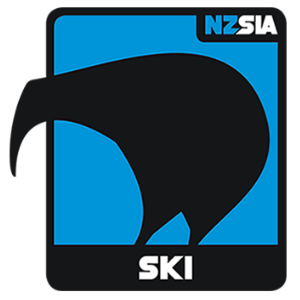
How Much Would I Earn?
Most instructors earn anywhere between $9-15 per hour, while those with more experience can earn up to $20.
Private instructors will definitely earn a lot more and if you teach in the US, you can also expect good tips!
Teaching Year-Round
If you want to be a full-time, all-year-round ski instructor, you'll need to move between hemispheres and follow where the snow goes.
This means you'll need a higher level of skills and qualifications for your best chance of achieving that.
The International Ski Instructors Association
After you pass Level 3 national certification, you can apply to become an ISIA certified ski instructor.
The ISIA issues 2 awards: the ISIA stamp and ISIA card.
A ski instructor course with the ISIA stamp or card will be held in higher regard compared to others, and will easily find a good job opportunity and great pay wherever in the world they choose.
There's also no need for you to take a certification exam each time you decide to move and teach at a ski resort in other countries.
Usually, you'd need to receive a qualification from whichever skiing association is the governing body in that particular country.
Ask a Training Consultant
The best research would be to get in touch with a training consultant at the school of your choosing.
They'll be able to let you know about potential employers and which course would best suit your goals based on their own experience as an instructor.
2. Set Your Budget
After you've decided which course you'd like to take and which resort/school you'd like to train at, it's time to set your budget!
In general, skiing is an expensive past-time and aside from the course fees, you'll need to figure out lodging and your other basic necessities.
If you will be working a regular job the rest of the week, allocate and figure out expenses to and from the mountain resort.
Like we mentioned earlier, the costs will start to pile up while you're completing your instructor course and for every qualification exam, you decide to take.
Staying at a ski resort for an entire season might not be the best idea logistically or budget-wise, however, some schools may provide lodging options or at least give you suggestions.
3. Book Ahead
Ski/Snowboard Instructor Courses
Schools and courses can become full way before the season begins, so be sure you've secured a spot!
Plus, the earlier you book a spot, the more time you'll have to save up and pay the course fees.
Course fees are often payable in installments, so it's also possible to pay them off while training during your own instructor course.
Flights & Visas
If you book ahead, you'll also be able to avail yourself of cheaper flight options!
Be sure you have all the qualifications and the right visa needed to complete your course and work in the country of your choosing.
France for example requires additional qualifications. This is because the Fédération Internationale de Ski (FIS) is the HIGHEST international governing body for skiing and snowboarding in the entire world.
Lodging
Considering you'll probably be taking your course during peak season when there's lots of snow, you'll definitely need to book ahead.
4. Prepare Your Equipment
Even if you've already moved past renting and invested in your own gear, you might want to update them.
You'll need the best equipment to keep up with the rigorous training and you'll want to buy things that will last.
5. Training
While you don't need to start out with the best skills, you'll have to keep training yourself in the long run.
Although you'll naturally improve your skiing ability while you continue to teach and aim for the next qualification level, it wouldn't hurt to polish your techniques.
As for your teaching methods, they'll increase with more experience.
If you're interested in learning more about training for the sport, as well as the best snow gear, check out Snow Gaper for some great advice!
The Life Of A Ski Instructor
It's great meeting like-minded people from all over the world that share your love for skiing.
There are also lots of events and parties to attend at ski resorts! Teaching is one of the best jobs in the world, but it definitely has its up and downs.
During Season:
During the busy season, you can expect pretty much no breaks. You'll spend all day instructing people and all night resting, probably too tired to do anything else.
It's definitely rewarding during this time, seeing happy families on vacation and students pleased with their improvement.
You'll also be happy to have a steady flow of income!
Off-Season:
Although the mountains in Lake Tahoe can be busy all year round, it's the amount of snow you get on the mountain that determines proper skiing conditions.
During the off-season, you might find yourself bored to death as a ski instructor. This time of year can be discouraging, especially with little to no income.
Or...this could be a perfect time for you to either:
1. Start private classes with a selected group of beginners or 1 or 2 novice skiers
2. Dive into another passion project
This is why many instructors will work somewhere else or have two careers.
Refresher Courses & Training:
Instructors need their own instructor too sometimes— especially instructors working towards an ISIA card.
Your own instructor training should be maintained while working towards higher qualifications and also afterward to maintain them!
In particular, ISIA stamp status requires further training every 1-2 years.
You'll also need to upkeep whatever other certifications you have by putting in the number of hours required and paying annual fees.
And like we mentioned earlier, more training will improve your skiing ability and skiing level so you can build your client base!
Getting Started
Now that you've learned more about how to become a ski instructor, we wish you the best on your instructor journey!
It's definitely much easier said than done, but many people live fulfilling and successful lives as ski instructors.
You're just now getting started so buckle up for an amazing journey!
Was this article helpful? If you feel you're ready to learn more advanced tips and tricks, check out our helpful skiing resource here!
Related Posts:
 |
 |
 |
 |

About Frank V. Persall
Frank is originally from the UK, but he has a passion for skiing that knows no bounds. He has made it his life's mission to visit the best ski resorts across the USA and the World. Frank loves spending time with his wife and three children on ski slopes, as they all share his love for the activity.
Thoughts on "How to Become A Ski Instructor: Qualifications And 5-Step Guide"
 |
 |
 |
 |
You can get FREE Gifts. Or latest free skiing books here.
Disable Ad block to reveal all the info. Once done, hit a button below
 |
 |
 |
 |